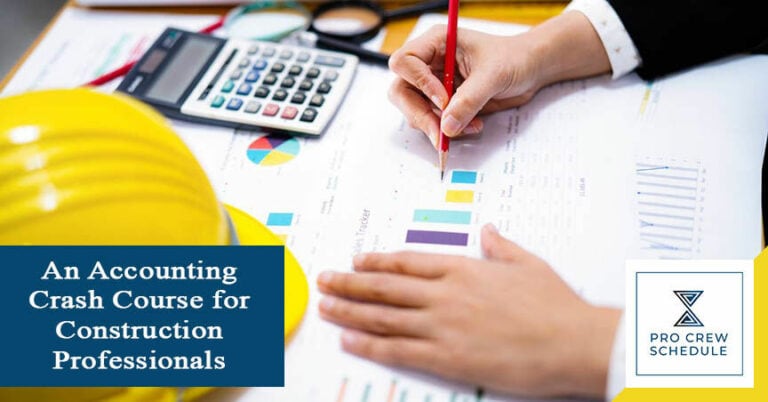Managing construction projects involves a lot of scheduling, manpower management, and resource tracking for operations to progress toward completion. However, accounting is one of the areas of construction that professionals are too busy to tackle, even if a big part of their business rests on it.
Accounting concepts differ from one industry to another, and construction professionals need to familiarize themselves with this area. Most construction companies hire an Accountant to handle their business’ bookkeeping, but it’s still essential for project managers to have a background on how their cash flows on the daily.
Unlike other industries, accounting in construction focuses more on monitoring costs categorized properly. These major costs are tools and equipment, building materials, labor, and many others. With this in mind, it shows how critical accounting is in everyday operations and how important it is for non-accountants on the job site to understand accounting basics to better manage workflows, expenses, revenues, and the project’s overall bottom line.
What is Construction Accounting?
Construction accounting has its very own style in terms of financial and bookkeeping management.
Construction accounting has its unique style of financial accounting and bookkeeping management. It is designed to allow general and subcontractors to track each task and its overall impact on the business. Contractors must be familiar with basic concepts of general accounting, which have different characteristics than those adopted in other industries.
Let us learn what differentiates construction accounting from the accounting principles applied in other industries.
What Distinguishes Construction Accounting from Regular Accounting?
First and foremost, construction accounting and regular accounting are not the same.
While most industries, such as manufacturing or commercial, can adapt regular accounting principles to their businesses, construction accounting is an entirely playing field. Most businesses offer fixed services or products for a fixed price from a fixed location. For instance, a coffee shop might sell iced coffee for $7. However, unlike other industries, the construction industry offers customized work in changing locations. No job is the same, making construction accounting a very difficult game.
Some of the major differences that separate construction from accounting concepts of other industries are the following:
1. Accounting in Construction is Project-Based
Construction businesses primarily operate according to projects, while other businesses have more consistent and stable profit centers. Each department or division of the company makes a specific contribution to the company’s overall bottom line.
Viewing construction projects as a company’s individual profit centers might be easier. Even though projects are constantly starting and ending and have different requirements depending on several factors, making project profits and losses separate per project will help you ensure that each of your profit centers is profitable. The project-centered convention of construction accounting also means that the industry needs a different way of keeping track of expenses for each project.
One thing to note about managing construction projects is that no project has an identical associated cost. There may be two projects that have similar requirements,
but some factors, including manpower and equipment availability, location conditions, and others, could result in entirely different associated costs.
2. Inconsistent Construction Cost
Lastly, one of the most common challenges in the accounting of construction companies is the ever-changing cost. Other industries have a fairly consistent overhead cost that can be templated for their businesses. For them, fixed costs and variable costs are easily pre-determined and can be easily controlled.
However, the construction industry doesn’t have a cost blueprint that is copied and pasted between projects – cost planning is more like a guessing game with the unique associated costs that are added to projects. All projects also have unique timelines, and we know that in construction, time is money, meaning all projects have different costs.
Additionally, distinguishing overhead costs from project costs is extremely difficult, even for veterans in the construction industry. To solve this dilemma, it can be helpful to ask during cost planning, “Would I still have incurred expenses if I didn’t have these contracts?” Answering this question will help your team decide whether you need to allocate indirect costs to activities so they will be billed appropriately.
Indirect costs may still be needed for a project’s close-out but are usually overlooked when attributing costs to specific jobs. One thing you can implement is carving out a certain percentage from your revenue dedicated to indirect costs that you can use for all your construction projects.
3. Multiple Work Locations
Unlike other industries where work is being operated at a fixed location, the construction industry with multiple project locations must manage the accounting operations that constantly switch from the office to the field. Construction worker schedules constantly change, and material inventory is usually moved from site to site to complete various jobs.
This means that you have to consider additional costs such as travel, insurance, handling, and other expenses related to moving between project job sites. You should also consider managing construction equipment, inventory, and labor simultaneously to efficiently reach the project deadline despite the additional cost and locations.
What are the Common Construction Accounting Reports?
Some of the accounting reports that you will constantly find in the construction industry are the following:
1. Cash Balance or Cash Flow Report
This kind of construction accounting report is a periodic report that details the money received versus the money spent in a specific time frame. This accounting statement is typically used in projecting the future expenses of a particular construction project.
2. Profit and Loss or Income Statement Report
The report contains a tally of all the expenditures of the project and the total revenue that the project made. It provides insight into how much the company profited or lost through the construction project lifecycle.
3. Balance Sheet
On the other hand, the balance sheet reflects the information of the shared cost that the company holds and the total assets, alongside liabilities incurred when the balance sheet is released.
4. Accounts Receivable Aging
This report contains all the pending payments of the company. These pending payments already have the invoices released. Thus, it helps track late payments and formulate collection strategies to follow up as needed.
5. Accounts Payable Aging
Lastly, an accounts payable aging report reflects the details of the money that the construction company owes to subcontractors, suppliers, and vendors.
What are the Accounting Methods that are Applicable to the Construction Industry?
Now that we have defined construction accounting, distinguished its difference from regular accounting concepts, and listed all the common accounting reports you will come across in managing construction projects, it’s time to dive into the accounting methods that can be applied to the industry.
1. Complete Contract Method
The completed contract method refers to reporting the income only when a contract is fully completed, even though payments may be divided and received throughout the project duration. In comparison, this accounting approach is typically the most used method in the construction industry, especially for short-term contracts under two years.
General and subcontractors also implement the completed contract method if it’s difficult to calculate a project’s completion percentage or if they want to defer paying their taxes. This accounting method allows contractors to defer their tax payables until a project is completed. Remember that using this method could increase your tax burden if tax laws in the United States are amended. While this can be tagged as the contractor’s favorite, proceed with caution when using this method for your company.
2. Percentage of Completion Method
If the complete contract method is the most used accounting method, the percentage of completion method, on the other hand, is the most recommended to be used by contractors in construction. This is because this method provides a more accurate approach for accountants to project each construction project’s gross profit and losses. Contractors record expenses and income regularly throughout each project milestone, and revenue is only computed for the portion of the project that has already been completed.
The percentage of completion method is ideal for long-term construction contracts since tax calculations are made every year. This will greatly reduce contractors’ tax burden at the end of the project’s lifecycle and protect them from the risk of tax fluctuations.
3. Cash Basis Method
The cash method is the easiest and simplest accounting method in the construction industry. However, it’s important to take note that it can also provide the least accurate status of your company’s financial health.
This last method only records revenue once the money is deposited in the bank. Cost of sold goods and overhead costs are only recorded once expenses are paid. This could leave your company in the dark regarding the financial standing of your business. You might only realize your company is in a financial hole once it’s too late.
How Can Pro Crew Schedule Simplify Your Accounting Processes?
All in all, we can conclude that construction accounting is not simple at all, but there are tools that you can implement to make it less complicated.
Make construction accounting less stressful by adapting construction scheduling software to your business. Pro Crew Schedule gives a real-time overview of your schedule, inventory, and manpower. It also includes features that can help you control factors affecting your financial health.
Managing construction accounting is made easy with Pro Crew Schedule.







